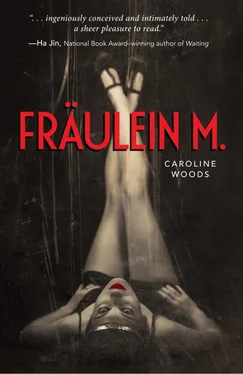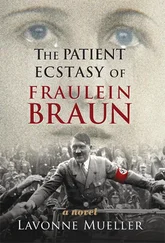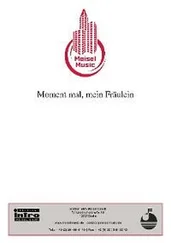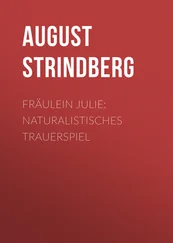“How wonderful of him,” Anita said, mouth dry. “And then? You continued to see him.”
“Yes. I did. His pull on me was that strong. But not anymore.” Margaret’s chin dropped to her chest. “Last month was the first I’d heard from him in years. He wrote to tell me he’d found you. When I saw the name Anita I assumed I had my answer as to who died in the prison. I’m sorry, Berni. I am so sorry for her.”
Anita hadn’t even noticed Janeen rise from the couch, but suddenly there she was, standing beside her aunt, stretching her fingers toward Margaret’s arm. At her touch, Margaret flinched, then relaxed. “I also knew,” she said, her voice firmer, “that the only way this could end was with Klaus’s capture.”
Klaus’s capture. But Klaus wasn’t here now. He’d gone. He was free as a bird. “I should have called the FBI when I had the chance,” Anita said.
Slowly Margaret shook her head. “Not the FBI. Think, sister. The FBI will do no good.”
The room blurred and tipped. “You are trying to tell me he was an informant.”
“A CIA informant, yes, perhaps. I know he was given a visa in 1945. This is why we have to tread very carefully. I do not know what a call to the American authorities would do.”
Margaret’s eyes were cold, icy blue in the light reflected from the windows. “I beg of you, please. You do not need to forgive me, but you must believe me.”
Anita swayed on her feet. She heard her own voice telling Janeen they had to go, to meet her down at the curb if necessary, to say goodbye to her aunt for both of them—she said this as though Margaret was not in the room.
She left the elevator for Janeen and took the stairs, turning down and down and down until she burst into the street. The rain had abated, but everything still felt cool. After her breathing evened, she looked up slowly at a pigeon bobbing its head in front of her, at two young men sprawled on a tarp. Both were too young to live on the street. One wore women’s shoes.
We’re the sisters. Her sister had fallen from a window in a Gestapo prison. She searched for a better image to focus on, a happy one, so that a shape on the ground would not be the Anita that stayed in her mind. Anita at Lake Wannsee, flirting with a burly American. Anita peering into a mirror with her mouth open, trimming her eyebrows with a razor blade.
Janeen stayed inside a long time, long enough for Anita to begin to worry. She had nearly worked up the nerve to find her way into the building again when her daughter came out the front door, her face ruined from crying. “You aren’t going to do it, are you, Mutti? You can’t call the FBI. Will you?”
“Shh,” Anita murmured, gathering her close.
“I know she’s telling the truth.” Janeen’s eyelashes were pulled into points by her tears. “What she just told me… I know she’s about to turn him over.”
“How do you know?”
“She told me more, about Germany, about Klaus,” Janeen said, looking stunned, looking like the most tired seventeen-year-old Anita had ever seen. “She had a gun, but she… she wants to do right this time. She said that. And I believe her.”
“Okay, Liebchen ,” Anita said, too weary to argue or even to ask about this gun. “It is time for us to go home.” She expected Janeen to protest, but instead, she nodded and pulled a dark piece of hair out of her lips.
Dark clouds roiled overhead. In the distance, faint thunder. Anita could sense Janeen remembering Klaus at the same time she did, wondering if he was somewhere nearby, watching. Anita hustled them toward Broadway, waving one arm at each taxi that passed, the other wrapped tightly around her daughter.
Grete had first heard of the Blumenthals, of all places, at the Café am Zoo. She hadn’t returned in three years, but everything looked the same: potted palms and fig trees, the three-story ceiling covered in green tiles like scales. Even the crowd, mostly uniformed men and expensive-looking women, could have been the very ones who’d stared at her that night she waited for Berni, the girl with a suitcase under her chair.
Before their entrées arrived, Klaus slid a folded square of paper across the table.
“I wasn’t expecting an assignment so soon,” she said quietly, her voice lost in the din of the restaurant, the buzz of good news. Czechoslovakia was now the Protectorate of Bohemia and Moravia, thanks in large part to the success of Case Green, an SD operation. “I’m already tracking Herr Reuter.”
“I know, darling.” Klaus made his eyes pained, sympathetic, the way one might look at a dog. He leaned over the table and kissed her hand. She felt the give of his soft lips, the immediate response between her legs. “But stakes are high—the Poles could invade any minute.”
She unfolded the paper. Mr. and Mrs. Caleb Blumenthal. “Jews?” she said. “They’ll never let me inside. The Winter Relief wouldn’t send a nurse to check on a pair of Jews.”
“The wife has a condition,” Klaus replied. “We think they’re plotting to abscond without paying their property levy. A neighbor heard them phone a doctor in Sweden. They’ll let you in.”
Their wine arrived, and he inspected the bottle, gave a generous smile to the waiter. “In the Republic years,” he said, pouring Grete a glass of Riesling, “Mr. Blumenthal was a Lyzeum schoolteacher, a known rapist of students, I’m afraid—”
“Stop. Please.” Each time he needed her to check up on someone, there was a story; the former doctor was a pedophile, the family of Communists had been plotting to blow up a school. She had to look at the ceiling to keep from crying. A chandelier the size of a Volkswagen dangled in the center. She imagined what would happen if it fell, the crater it would leave in the checkered marble floor. Shards of brass propelled outward like shrapnel.
“I can’t do this,” she said quietly. “Not again.”
“Pardon?” he replied, and he leaned forward, one hand cupped around his ear. “I’m sorry, I couldn’t quite hear you.” He seemed to know she wouldn’t repeat herself. “You know I’ve brought you into the SD network to protect you, my love. Need we revisit your close calls?”
She shook her head, staring at the heavy chandelier. She saw herself choosing the weakest link in its chain, taking aim, firing.
• • •
Guns, not butter : Goebbels’ slogan was everywhere in early 1939, to get people to accept the rations. The average German could live without butter; the Reich as a whole would never survive without guns.
Grete had both.
Klaus had installed her in a new apartment complex in Neukölln; all day she heard planes ripping overhead. She did her best to hide the scents of coffee and butter from her neighbors, but she saw the way they looked at her. Late at night, she heard them return from the factories where they assembled electronics or airplane parts as she hid in bed with a cup of chocolate, another gift from Klaus. Through the thin walls she heard them complain about low wages, the tariffs taken out of their paychecks for food, uniforms, time off. They couldn’t even change jobs without permission from the Party. They feared war would break out before the end of the year. They lived like slaves. They questioned Hitler. Occasionally she reminded herself—when she wanted to feel better—that she could have turned them over for questioning the Reich, but chose not to. She only spied on people when Klaus asked.
He visited sporadically, when he was in town, and her neighbors treated him with fear and respect whether or not he wore the uniform. He usually came at night, after suppertime, a paper bag full of rationed goods in his hands, her next assignment in his pocket.
Читать дальше












